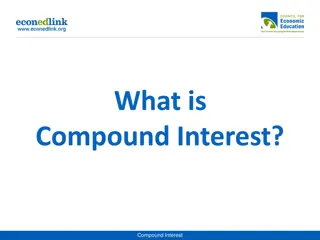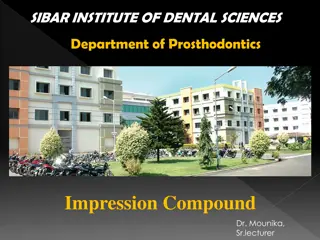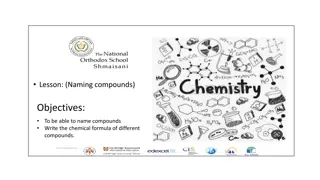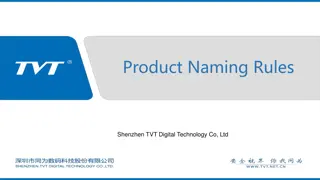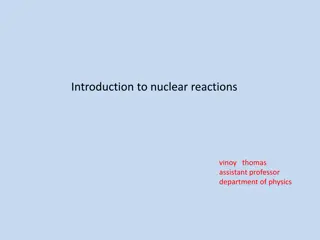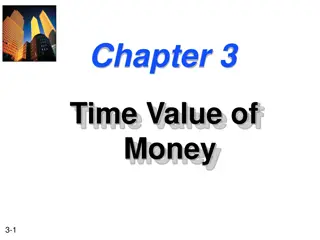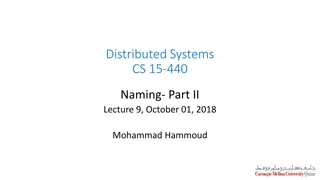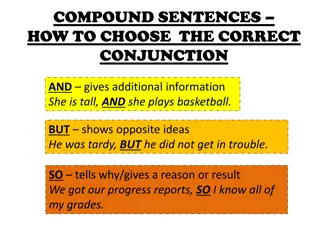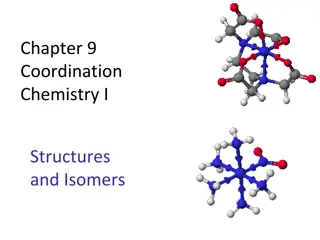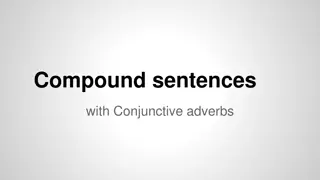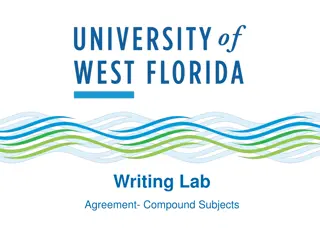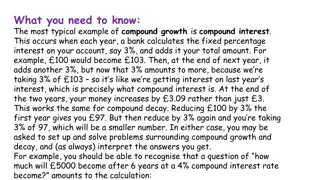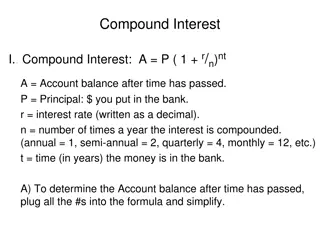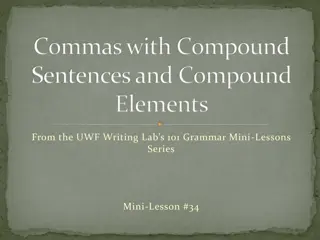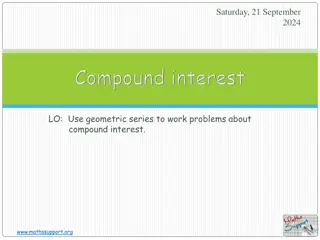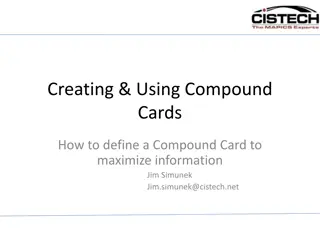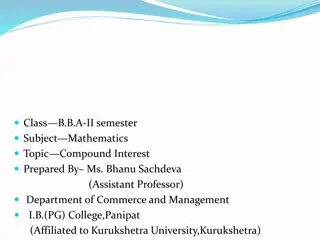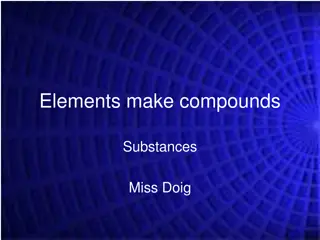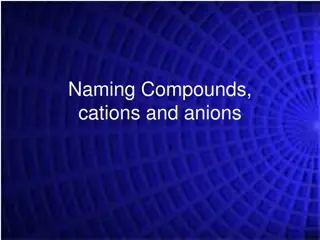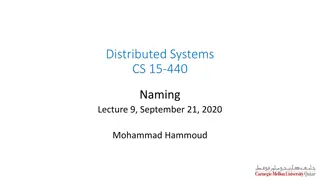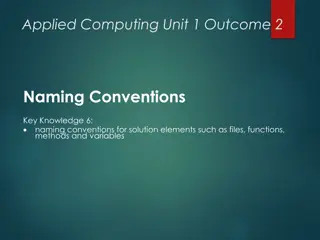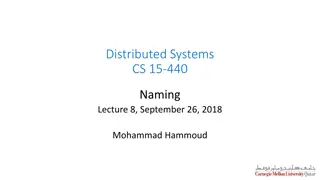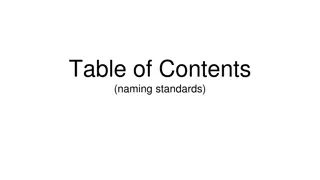Factors That Help You Select The Most Appropriate Purging Compound Supplier
Are you running a plastic manufacturing & processing unit? It is crucial to utilize a high-quality Purging Compound to ensure efficiency and cleanliness in your production machines & equipment.\n\nFor more info visit: \/\/ \/purging-compound\/
1 views • 6 slides
Mastering the Use of Hyphens in Compound Adjectives
Hyphens play a vital role in creating compound adjectives by joining words together to form longer descriptive phrases. This guide provides tips on identifying, using, and creating compound adjectives with hyphens to enhance your writing skills. Discover the importance of hyphens in maintaining clar
0 views • 8 slides
Sentence Structures: Simple, Compound, Complex, and Compound-Complex
Learn about the different types of sentence structures - simple, compound, complex, and compound-complex - through examples and definitions. Understand the components of clauses and sentences, including independent and dependent clauses, to enhance your understanding of English grammar.
2 views • 11 slides
Understanding Light Perception in Insects
Insects perceive light through various receptors such as compound eyes, ocelli, and stemmata. Compound eyes, made up of ommatidia, play a key role in capturing light stimuli ranging from UV to red wavelengths. Different types of compound eyes, like dioptric and holoptic, form images differently for
3 views • 12 slides
Efficient File Naming Conventions and Folder Organization
Learn best practices for naming files and structuring folders to improve organization and efficiency. Explore tips on file naming, consistency, leading zeros, format limitations, and folder hierarchy. Enhance your workflow by implementing a logical system that streamlines file management.
1 views • 13 slides
Recrystallization for Solid Organic Compound Purification
Recrystallization is a laboratory technique used to purify solids based on their different solubilities. It involves dissolving an impure solid in a suitable solvent, cooling the solution to allow pure crystals to form, filtering to isolate the purified solid, and drying it. Finding a good recrystal
1 views • 11 slides
Understanding Compound Interest and Simple Interest Formulas
Interest rates play a crucial role in financial transactions. Compound interest is earned on both the principal and accumulated interest, while simple interest is earned solely on the principal amount. Different compounding frequencies affect the overall interest earned. Learn how to calculate simpl
1 views • 14 slides
Understanding Impression Compound in Dentistry
Impression compound is a key material in dentistry used for making negative reproductions of teeth and surrounding structures. It plays a crucial role in the fabrication of dentures, crowns, bridges, and orthodontic appliances. The accuracy of the impression directly impacts the fit and functionalit
3 views • 17 slides
Understanding Compound Interest in Class VIII Mathematics
In this chapter, students will learn about simple interest and compound interest, memorize their formulas, derive compound interest formula from simple interest concept, calculate compound interest with different compounding frequencies, understand growth and depreciation concepts, and derive formul
1 views • 29 slides
Mastering Compound Naming for Chemistry Students
Develop your ability to name compounds and write their chemical formulas with ease by understanding the naming conventions for different compound types. Learn about compounds composed of metal and non-metal elements, compounds containing oxygen, and those made only of non-metals. Practice naming spe
2 views • 14 slides
Understanding TVT Digital Technology Co., Ltd. Product Naming Rules
This document by Shenzhen TVT Digital Technology Co., Ltd. provides detailed insights into their product naming rules. It covers the overall classification, codec specifications, DVR configurations, and more, aiding customers in better understanding TVT products through clear naming conventions.
0 views • 41 slides
Understanding Nuclear Reactions: A Comprehensive Overview
Nuclear reactions involve direct and compound scenarios, with direct reactions occurring in a short period and compound nucleus reactions leading to long-lived excited states. Different types of reactions like elastic scattering, break-up, and compound nuclear reactions are discussed, highlighting t
5 views • 11 slides
Understanding the Time Value of Money: Simple vs Compound Interest
Explore the importance of time in financial decisions, the difference between simple and compound interest, and how it affects the future value of your investments. Learn about the formulas for simple interest, examples of its application, and the significance of compound interest for maximizing ret
1 views • 60 slides
Understanding Naming in Distributed Systems
Exploring the concepts of naming in distributed systems, including flat naming, structured naming, name spaces, name resolution, and name linking. Examples and visual explanations are provided to illustrate each concept, emphasizing the importance of structured and organized naming schemes in distri
0 views • 28 slides
Understanding Compound Words and Phrases in Morphology & Syntax
Exploring the differences between compound words and phrasal words in linguistics, this content delves into how roots combine to form compounds and how phrasal words function syntactically. Through examples like "green house" versus "greenhouse," as well as stress and semantic criteria, the distinct
1 views • 51 slides
Mastering Simple and Compound Sentences: Rules and Examples
Explore the world of simple and compound sentences through detailed explanations, examples, and rules. Learn how to identify, structure, and transform sentences from compound to simple form. Enhance your understanding of sentence construction and improve your writing skills.
0 views • 17 slides
Mastering Compound Sentences: Choosing the Correct Conjunctions
In compound sentences, choosing the correct conjunction (AND, BUT, SO) is essential to convey the intended relationship between ideas. This task involves matching sentence endings to conjunctions, understanding how each conjunction functions in forming connections between clauses. Through examples a
0 views • 8 slides
Understanding Sentence Structure: Phrases, Clauses, and Compound Sentences
Learn about phrases, clauses, simple sentences, conjunctions, and compound sentences in English grammar. Understand the differences between independent and dependent clauses, how to form compound sentences using conjunctions, and practice writing sentences about Justin Bieber. Explore the components
1 views • 21 slides
Understanding Coordination Chemistry: Structures, Isomers, and Naming
Exploring coordination chemistry involves understanding structures, isomers, naming conventions, and common coordination numbers, all essential in studying coordination compounds. Coordination compounds consist of central metals, ligands, and charge balancing ions. Naming involves listing cations, l
0 views • 46 slides
A Guide to Using Conjunctive Adverbs in Compound Sentences
A conjunctive adverb is an adverb used to connect clauses or parts of a sentence. When joining compound sentences with conjunctive adverbs, use a semicolon and a comma. Examples and guidelines are provided for proper usage. Practice formulating compound sentences with conjunctive adverbs to enhance
0 views • 7 slides
Understanding Stress in Compound Words for English Pronunciation
Explore the rules of stress placement in compound words in English pronunciation. Learn how stress can shift based on word combinations and types. Discover the differences in pronunciation between compound words, adjectives, nouns, and verbs for accurate spoken English.
0 views • 4 slides
The Importance of Naming in Software Development
Effective naming of variables, functions, and concepts is crucial in software development to enhance readability, maintainability, and communication among team members and stakeholders. This article stresses the significance of thoughtful naming conventions, providing insights into the impact of nam
0 views • 50 slides
Understanding Compound Subjects in Grammar
Compound subjects joined by "and" usually require plural verbs, while compound subjects joined by "or," "nor," "either or," or "neither nor" may be singular or plural depending on the subject closest to the verb. Recognizing when to use singular or plural verbs with compound subjects is essential fo
0 views • 5 slides
Understanding Compound Growth and Decay Through Examples
Compound growth and decay, specifically compound interest, involve calculating interest on a changing total amount over time. This concept is illustrated through various examples and equations, showcasing how investments or values increase or decrease with each period. Learn how to solve problems re
0 views • 9 slides
Understanding Compound Interest Formulas and Examples
Compound interest is a powerful concept in finance that calculates the growth of an investment over time. This summary explains the formula for compound interest, how to calculate account balances and interest earned, and examples for various scenarios. You'll also learn how to solve for the princip
0 views • 7 slides
Mastering Commas in Compound Sentences
Learn how to effectively use commas in compound sentences and compound elements. Discover when to include commas before coordinating conjunctions that separate complete sentences and when it's appropriate to leave them out for short sentences. Understand when not to use commas when coordinating conj
0 views • 4 slides
Understanding Compound Interest: A Practical Guide
Compound interest is a powerful financial concept that can significantly impact your savings and investments. This guide explains how compound interest works using geometric series and provides a step-by-step solution to a compound interest problem. Learn about the types of interest, the difference
0 views • 26 slides
Understanding Compound Inequalities: Solve, Graph, and Interpret
Explore compound inequalities, learn to solve them step by step, graph the solutions, and grasp the concepts of "and" and "or" in the context of mathematics. Practice solving and graphing various compound inequalities for a clearer understanding of how they work.
0 views • 26 slides
Understanding Compound Sentences: Examples and Usage
A compound sentence is a group of words containing a subject and a predicate, expressing a complete idea. It can be brief or extended with qualifiers. Independent clauses are combined with coordinating conjunctions like "and," "but," or "or" to form compound sentences. Semicolons and transitional ex
0 views • 8 slides
Understanding Compound Cards for Maximum Information Utilization
Compound cards offer a versatile way to present and manage information in a structured manner. They are akin to workbenches but in a compact card format, allowing for efficient display of details across 2 to 4 sections. Learn how to define, create, and utilize compound cards effectively to enhance i
0 views • 31 slides
Comparison of Compound DC Motors and Their Characteristics
Compound DC motors, including cumulative, differential, and compound configurations, offer unique operational features based on how the series and shunt field windings are connected. Cumulative compound motors provide improved torque characteristics but lower speed, while differential compound motor
0 views • 12 slides
Understanding Compound Interest in Mathematics
This detailed content explains the concept of compound interest in mathematics, covering key terms like moneylender, borrower, principal, rate, and amount. It also delves into simple interest, types of interest, and provides formulas for calculating compound interest based on different scenarios. Pr
0 views • 12 slides
Understanding Compounds and Elements through Experiments
Explore the world of compounds and elements through engaging experiments involving magnesium, oxygen, and more. Learn about the energy released when elements combine, naming conventions for various compounds, and the significance of oxygen in compound naming. Discover essential elements and their sy
0 views • 10 slides
Essential Information on Naming Compounds, Cations, and Anions
Learn about the essential elements, symbols, and polyatomic ions you need to know for naming compounds correctly. Understand rules for naming compounds when elements combine, including diatomic molecules, halogens, oxygen, and sulfur. Explore polyatomic ions with different charges and their names to
0 views • 12 slides
Understanding Distributed Hash Table (DHT) in Distributed Systems
In this lecture, Mohammad Hammoud discusses the concept of Distributed Hash Tables (DHT) in distributed systems, focusing on key aspects such as classes of naming, Chord DHT, node entities, key resolution algorithms, and the key resolution process in Chord. The session covers various components of D
0 views • 35 slides
Best Practices for Naming Conventions in Solution Development
Understand the importance of naming conventions for files, functions, methods, and variables. Learn how proper naming can enhance code readability, avoid potential errors, and ensure consistency across projects. Discover tips to create effective names that are easily understood, self-descriptive, an
0 views • 20 slides
Understanding Repeated Percentage Changes in Sales and Investments
This content covers examples and calculations related to repeated percentage changes in sales and compound interest investments. It explains how prices are affected when all items are reduced by a certain percentage in sales, as well as scenarios involving compound interest investments over multiple
0 views • 17 slides
Understanding Naming Systems in Distributed Systems
Entities in distributed systems are uniquely identified using names, addresses, and identifiers. Naming systems assist in name resolution and can be categorized into flat, structured, and attribute-based naming. Flat naming uses random strings as identifiers, and various mechanisms such as broadcast
0 views • 21 slides
Master Set of High School Chemistry Naming Rules
A collection of chemical compounds with their names and classifications as ionic or molecular. Includes explanations and ratios for naming compounds such as Co(OH)3, Mn(NO2)3, SiO2, Mn(MnO4)4, SF2, and ZrO2. Helpful for high school chemistry students to practice and understand naming rules.
0 views • 49 slides
Standard Naming Convention for Table of Contents
This document outlines the standard naming convention for organizing and labeling Table of Contents related to payer and issuer information, plan details, file types, and extensions. It includes specific examples and guidelines for naming files accurately and consistently. Adherence to these standar
0 views • 38 slides






